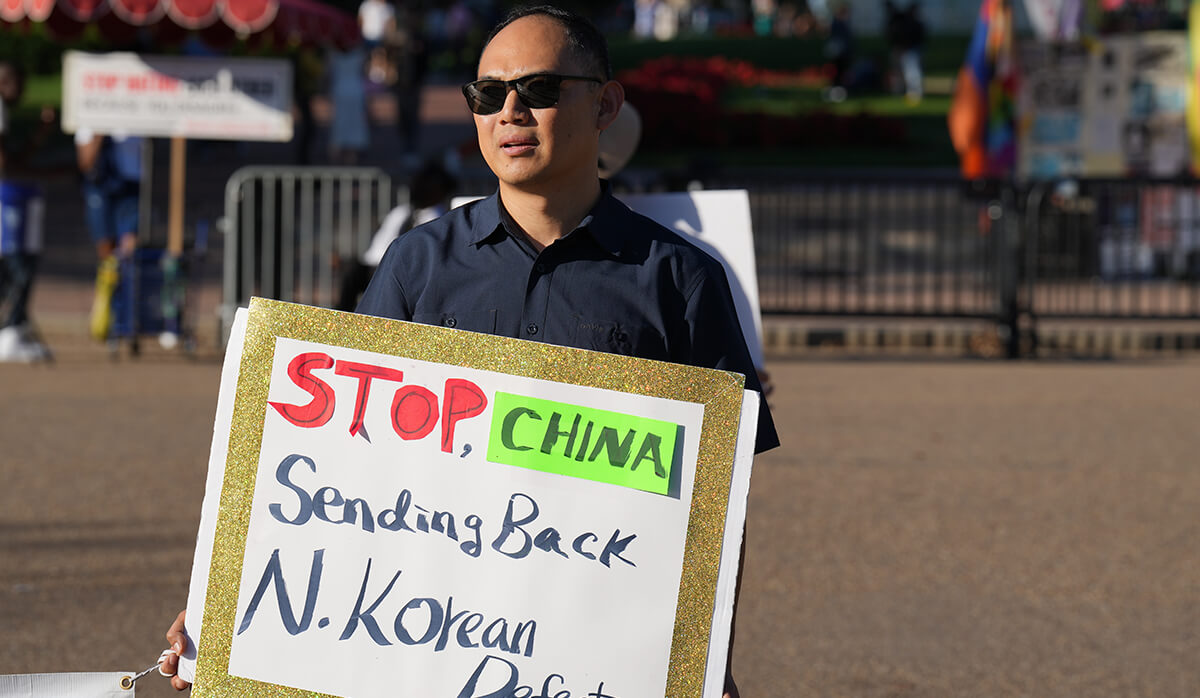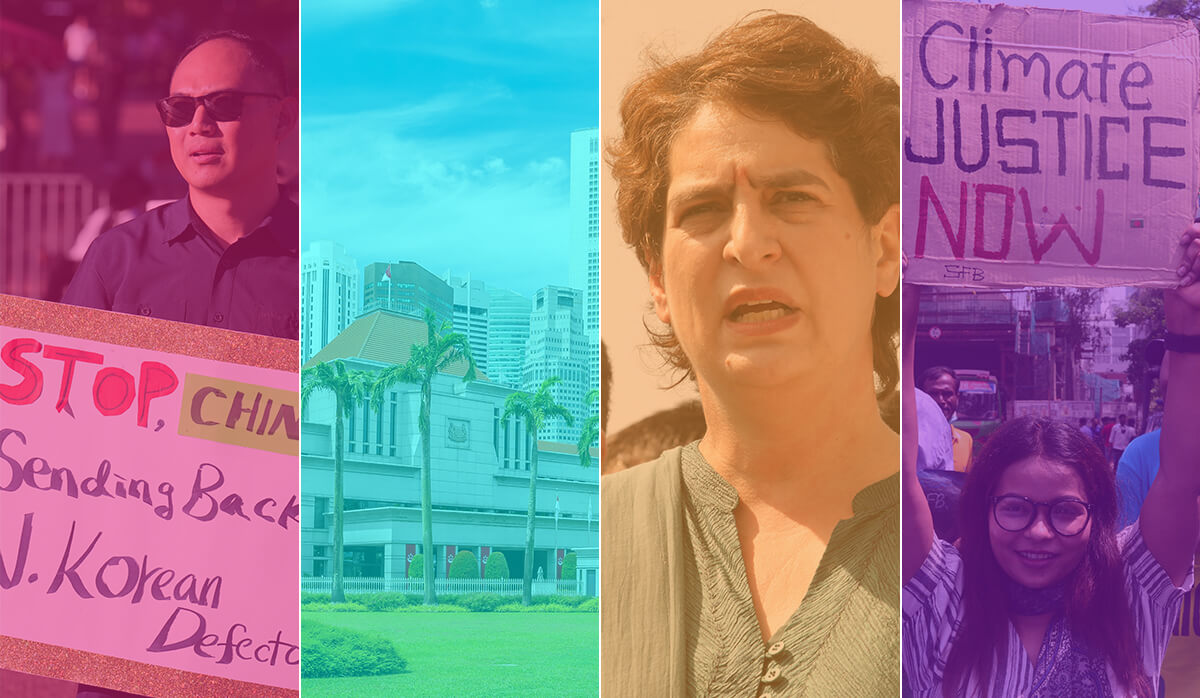NORTHEAST ASIA

A thwarted escape
Amid reports that China had sent more than 500 North Korean defectors back to Pyongyang, an international watchdog urged the world’s governments to denounce these actions and to call for an end to future repatriations of escapees, who are likely to face torture, abuse or even death upon their return.
The latest large-scale repatriation, said Human Rights Watch (HRW) senior Asia researcher Lina Yoon, happened on Oct. 9, when the Chinese government transported the North Koreans back into the reclusive country over five separate border crossings.
This comes on the heels of separate forced repatriations of 80 North Koreans on Aug. 29; 40 on Sept. 18, and 50 others in July 2021, despite repeated international calls for Beijing to suspend their return.
HRW also urged China to “provide U.N. authorities with access to North Korean detainees and either grant North Koreans refugee status or give them safe passage to South Korea or other countries.”
China, Pyongyang’s closest ally and economic lifeline, has a policy of deporting North Koreans under a 1996 bilateral border protocol with the socialist state, despite being a party to a U.N. refugee convention that prohibits the forced return of anyone at genuine risk of persecution or torture.
Elizabeth Salmon, the U.N. special rapporteur for North Korea’s human rights, estimated in September that more than 2,000 North Koreans who escaped to China have been detained there. It remains unclear whether they have all been sent back.
North Korea severely punishes defectors for committing “treachery against the nation,” punishable by death or by detention in abusive forced labor camps. It’s why rights groups have lobbied for North Korean defectors to be regarded as a “refugee sur place”: a person who becomes a refugee after leaving their country regardless of prior treatment or reasons for leaving.
In 2014, the U.N. Commission of Inquiry on Human Rights in Korea even warned the Chinese government that it was at risk of criminal liability for abetting crimes against humanity over its policy of forced repatriation of North Koreans.
SOUTHEAST ASIA

Pressure on vs death penalty
Despite a global campaign to abolish capital punishment, Southeast Asia stands out as one of the few regions that insist on resorting to the death penalty to punish drug charges. Even so, families of death row prisoners in Singapore see glimmers of hope in nations like Malaysia and Indonesia, which have taken steps toward legal reform by issuing moratoriums on executions.
On World Day Against the Death Penalty (Oct. 10), these families pleaded with the government to review its capital punishment policies and to issue a similar moratorium on death sentences.
They urged its “most vocal and determined advocate in government,” Minister for Law and Home Affairs K Shanmugam, to “meet with us … listen to our stories, to our pain, and confront our humanity.”
“We believe sincerely that the least the Minister can do, in commemoration of this day, is to grant us the dignity of being heard. If his belief in the death penalty is an honest one, then he should allow it to be challenged, and see if it can stand up in light of the truths we have to share,” they said in a statement.
Singapore is one of 55 countries globally that still has the death penalty, despite concerns about its irreversibility, its potential for wrongful execution, and its disproportionate impact on minorities and the poor.
Last year alone, the city-state’s government executed 11 over drug charges — the first time after a hiatus in 2019, while their cases were under appeal. At least 50 more were on death row as of 2022, according to a 2023 report by Amnesty International.
Many of those sent to death row were from the Indian and Malay minorities whose communities comprise just over 20 percent of Singapore’s population, according to a 2020 report from MalaysiaNow. Often these are just low-level drug users who did not receive support to recovery, according to Transformative Justice Collective member Kirsten Han.
This is in violation of international human rights law, which prohibits the use of the death penalty for crimes that do not meet the threshold of “most serious crimes.”
SOUTH ASIA

Landmark law for equality
After successfully lobbying for the passage of a landmark law ensuring women representation in local governance, women’s groups in India have now called for its immediate implementation to make gender equality a reality.
“We, the women of India, have no more time to waste,” said Priyanka Gandhi, leader of the All India Congress Committee (AICC) of the Indian National Congress party. “It is our right to be counted in the political process. I demand that our worth be valued and respected as a political instrument for our empowerment.”
Gandhi’s calls come three weeks after India announced a bill that would reserve one-third of seats in the more powerful lower house and state legislative assemblies for women.
Called the Nari Shakti Vandan Adhiniyam, or Women’s Reservation Bill, the proposed law languished for 27 years as conservative heartlands unwilling to have minority women leaders blocked the measure, before finally gaining ground under Prime Minister Narendra Modi.
According to Reuters, citing government data, only 13 percent, or 104 out of 788 MPs elected during the last national election in India in 2019, are women.
More broadly, India’s patriarchal culture has made it a laggard in terms of gender equality, placing 127th out of 146 countries in the 2023 World Economic Forum Gender Equality Report.
But even with the law in place, its champions cannot afford to be complacent. For one, the law will not apply to next year’s general election. For another, the quota implementation could take years before it becomes a reality. This, only after the redrawing of electoral constituencies, which will only happen after the completion of India’s once-in-a-decade census.
“As I can see, some of you men are happy but we women are not. We are going to fight for it till we eventually get it. Whether you men like it or not,” Gandhi assured.
GLOBAL/REGIONAL

Making more space for women and girls
Girls and women are often among those most impacted by the climate crisis. Despite this, a new U.N. Population Authority (UNFPA) report shows that only a third of the world’s countries include sexual and reproductive health in their national plans to tackle the climate crisis.
On Oct. 10, the UNFPA urged the world’s governments to reexamine their policies and to make sure that their climate plans “meaningfully account” for the delivery of gender-based services during climate-related events.
“The climate crisis is not gender-neutral,” says UNFPA Executive Director Natalia Kanem. “Highlighting emerging evidence of the impacts of climate change on the health and wellbeing of women and girls…[this review] is a timely reminder of why it is so critical that countries prioritize sexual and reproductive health and rights in their climate strategies.”
The UNFPA study, titled “Taking Stock: Sexual and Reproductive and Health Rights in Climate Commitments,” examines whether sexual and reproductive rights are enshrined within states’ nationally determined contribution (NDC) plans.
Several studies have shown that women and girls bear the disproportionate impact of the climate crisis, which leaves them vulnerable to increased poverty, malnutrition, violence and poorer maternal health.
A 2022 report by the U.N. Climate Change, for example, found that during extreme weather events, the tasks of rebuilding and providing for their families often fall on girls and women. They are also often more likely to drop out of school.
Yet, UNFPA found that only 38 out 119 countries have integrated sexual and reproductive health rights in their NDC plans, which include support for access to contraception, as well as maternal and newborn health services. Only 15 countries make any reference to violence against women.
In Asia-Pacific, one of the most vulnerable regions to climate change, only eight of 25 countries (Cambodia, Laos, Marshall Islands, Nepal, Papua New Guinea, Sri Lanka, and Vietnam) have references to sexual and reproductive and health rights, gender-based violence, and other harmful practices, the report noted in their NDC plans.
Apart from calling for the integration of gender-based policies in “all aspects of climate change policies and programs,” the UNFPA also urged governments to increase support and funding for appropriate interventions and to make sure that women and other marginalized sectors are well-represented in climate policy-making bodies.
Gender-responsive policies and other climate-resilient policies will go a long way in enabling women to adapt to climate change such as through increased access to vital resources and opportunities to participate in decision-making.



















